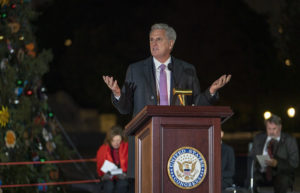
House Minority Leader Kevin McCarthy delivers remarks at the 2021 Capitol Christmas Tree lighting ceremony in Washington DC, December 1, 2021. USDA Forest Service photo by Tanya E. Flores.
Fiscal responsibility used to be a powerful credential Republican candidates could wield in their campaigns. In the past few years, though, claims of fiscal responsibility have been hard to back up with proof. In Spectator World, Jonathan Bydlak takes aim at the GOP’s increasingly cozy relationship with spending taxpayer money, writing:
Most Republicans can be counted on to scrap talking points about fiscal responsibility as soon as national defense is involved. But lately, it hasn’t just been about defense. Many, including current GOP leadership, have supported other Democratic priorities, too.
From the infrastructure bill and the CHIPS Act to Ukraine aid and the PACT Act, virtually all elements of the Democratic agenda have passed thanks to some Republican support. Even in cases like the PACT Act, where top leadership voted in opposition, other members like Congresswoman Elise Stefanik, chair of the House Republican Conference, lent their support.
This time, though, we are told things will be different. Conservatives from all corners are calling on Republicans to reject passage of a new spending package before the holidays, and instead push for a short-term bill to keep spending flat into the new year. Once Republicans are in control, this story goes, they will check the worst excesses of the Biden administration.
Call me skeptical.
For one, the prospective speaker himself has a long history of supporting big spending legislation. Last Congress, he voted for a multitude of Covid packages signed by President Trump, as well as the Bipartisan Budget Act of 2019, which raised established expenditure caps and paved the way for more spending across the board. In contrast, more than two thirds of House Republicans opposed that deal. But perhaps most tellingly, McCarthy also voted in favor of 2020’s lame-duck Consolidated Appropriations Act, which added more than $900 billion in new spending.
Republicans have a knack for opposing spending when Democrats are in power and voting to expand the national debt after they take over. Yet over the last two years — and right on into the lame duck — many have supported Biden’s spending with their votes even as they’ve opposed it with their words.
We’d all like to believe the story will be different this time. Yet politics is a predictable game, and the most likely outcome is that Republicans line up behind a big-spending lame duck package — just as they’ve done so many times before.
If you’re willing to fight for Main Street America, click here to sign up for the Richardcyoung.com free weekly email.





